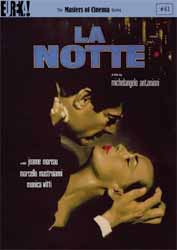|
Click here to return to the main site. DVD Review
Giovanni Pontano and his wife Lidia come to town to visit an old friend who is dying. Afterwards they attend a book party for the launch of his new novel, though everyone ignores Lidia who escapes the party to walk through Milan. A little later they attend a bar to watch an erotic dancer, only to find themselves finally, at the end of the day, in a park discussing the death of their marriage... If the synopsis of La Notte (1961, The Night), directed by the late, great Michelangelo Antonioni (1912 - 2007), seems a little sparse it is because not a lot happens in the film. There is little in the way of action as Giovanni and Lidia spend their day together. Rather the film is an intimate look at a couple whose marriage is in its final death throws. The film won the director three awards with a further two going to the actresses Jeanne Moreau and Monica Vitti, while Giorgio Gaslini won an award for best score. Antonioni paints a bleak picture of a soulless society with its intrusive noise. Its modern skyscraper cathedrals, dedicated to man's sterile technological prowess, stand amidst decaying streets - the concrete peeling onto the pavements where the abandoned children play. Antonioni reflects this loveless world with the loveless relationship between Giovanni and Lidia: He, an emotionless novelist. She, a woman relegated to the role of ignored and abandoned wife. This is highlighted in the scene of the book party, where Giovanni basks in the admiration of the local artistic great and good, whilst Lidia drifts through the whole even ignored by both her husband and his attendant hangers on. Antonioni picked the perfect couple to play Giovanni and Lidia in Marcello Mastroianni and Jeanne Moreau. Marcello plays Giovanni as all intellect, so much so that he admits to kissing a woman patient in the hospital after visiting their dying friend, while she is outside crying, not being able to cope with the idea of his death. He displays neither passion for the woman who throws herself at him nor any for the erotic dancer that they watch in a club. Moreau’s Lidia is a very different type, emotional and lost in the distance, which separates her from her husband, a distance that she finally cannot exist in. The film has a restored print, which includes previously censored scenes to present the film as the director intended. The movie itself is very clean with a nice black and white print. The PR blurb states that it has a new and improved subtitle, but not having committed it to memory from the last time I saw the film I’ll just have to take their word for it - certainly I could see nothing wrong with the subs. You don’t really get any extras apart from the original theatrical trailer, well I didn’t anyway, but once more the blurb promises a 40 page booklet with a new essay by the film critic and scholar Brad Stevens, and the transcript of a lengthy Q&A conducted in 1961 with Antonioni upon the films release. If true then it should bump up the desirability of the DVD. So another great release for film fans and for a film that might be seen as a navel staring exercise, it actually turns out to be an engaging exploration of love in a loveless land. 9 Charles Packer Buy this item online |
|---|



